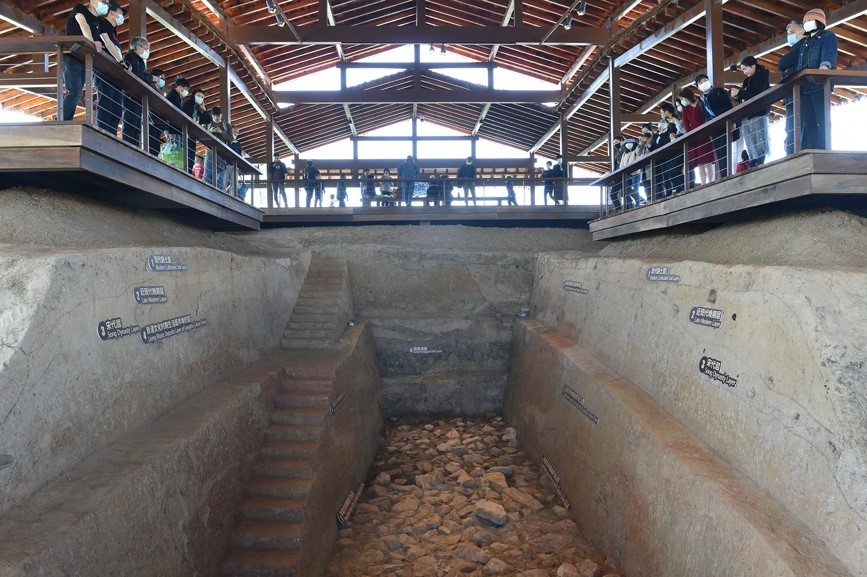technology adds new glamour to china's world heritage liangzhu cultural site

tourists visit the archaeological ruins of liangzhu city on april 8. [photo by pan haisong/people's daily online]
the archaeological ruins of liangzhu city in hangzhou, east china's zhejiang province, which symbols a supreme achievement of prehistoric rice-cultivating civilization of china over 5,000 years ago, is now resorting to digital economy and cultural and creative industry for wider promotion, as the industrial park liangzhu digital culture community was recently unveiled.
the archaeological ruins of liangzhu city, as a proof to the yangtze river basin's significant contribution to the chinese civilization, were inscribed on the world heritage list as a cultural site at the 43rd session of the united nations educational, scientific and cultural organization world heritage committee in baku, capital of azerbaijan, in july 2019.
over 30 projects have joined the liangzhu digital culture community, such as a livestream marketing program under alibaba's live-streaming arm taobao live, and an innovation base of digital entertainment established by netease media. besides, the community also attracted a series of public service platforms, such as the hangzhou branch of china big data center of innovation design.
the vitality for innovation driven by the integration of digital economy and culture is one reason that makes the community charming for young entrepreneurs. the unique glamour of the liangzhu culture is also an important factor.
the community takes the liangzhu culture as a huge intellectual property in which it combines liangzhu's historical and cultural heritages with animation, gaming, creative design, digital media, radio, film and television, arts and crafts, cultural entertainment and other industries, so as to blend together the ancient and the modern.
at a concept store in the archaeological ruins of liangzhu city, liangzhu culture is infused into all kinds of cultural and creative products by designers. for instance, the classic semi-human animal motif on liangzhu's jade wares is presented in a graffiti-style badge that goes very well on clocks, mouse pads, umbrellas and suitcases, receiving high popularity among the youngsters.
"we must revitalize traditional culture with innovation," said su huan, general manager of hangzhou innow creative & technology co., ltd., the designer of the graffiti-style semi-human animal motif badge.
recently, the company is stepping up efforts to produce an animated film about the liangzhu, its water conservancy system and relics, its culture, based on archaeological findings. the film will offer an opportunity for the audience to have a close look at liangzhu culture that can be traced back to 5,000 years ago.
"the community gives us a platform to exchange notes with our peers and archaeologists," said bai yu, an executive of the film production company jiaxing pictures, hoping that his company will have a virtual reality "playback" of the life in liangzhu city through visual effects and digital means.
to protect the archaeological ruins of liangzhu city and promote local development, hangzhou has piloted a compensation mechanism for the protection of the cultural relics. in recent years, the local government has allocated more than 10 percent each year of its land sale revenue to the protection of the ruins. it restores historical environment and natural ecology in the heritage area, and develops cultural tourism outside of the area as a way to carry forward liangzhu culture.
hangzhou is a leading innovator that witnesses rapid development of digital economy, where digital economy accounts for more than a quarter of its gdp and contributes to over 50 percent of its economic growth. besides, the city's yuhang district is home to two state-level entrepreneurship and innovation demonstration centers, hangzhou future sci-tech city and alibaba headquarters.
the liangzhu digital culture community needs to integrate technical, artistic and cultural elements, as well as business models across the world to form an innovative industrial chain based on the existing research and artistic achievements and big data resources, said pan yunhe, an academician of the chinese academy of engineering, adding that it should be the community's future direction and goal.
more technologies are expected to be applied in the community, such as facial-recognition registration, intelligent vehicle recognition and scan-and-go parking. in addition, the community will also build a number of cultural and leisure auxiliary facilities, so as to provide more joyful space for the young people in the digital culture sector.
